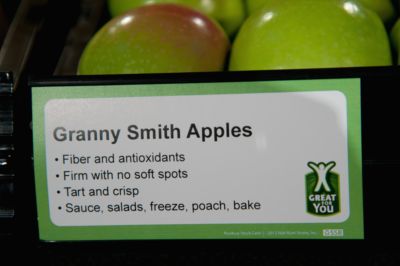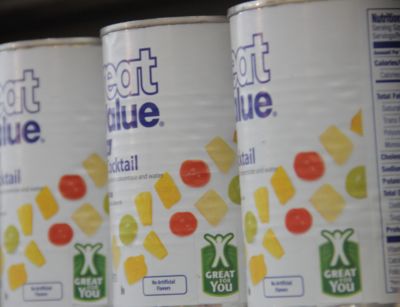To eat is a necessity, but to eat intelligently is an art.
– La Rochefoucauld
This week Wal-Mart unveiled its packaging featuring the “Great for You” symbol on their house labels, reserved for those foods that meet certain criteria:
Single ingredient foods:
- fruits or veg: fresh, frozen, canned, dried, 100% juice
- 100% whole grain
- unflavored low or no-fat milk & yogurt
- lean protein (eggs, seafood, meat or poultry)
- fats or oils, nuts or seeds whose calories that come from saturated fats total less than 15%
Foods that contain a single ingredient food AND meet certain standards for:
- fat content (no labeled trans, saturated fat account for less than 10% of calories, total fats account for less than 35% of calories)
- sodium content (380mg or less in single food item, less than 600mg for mixed dishes)
- added sugars (no more than 25% of total calories).
In a press release, First Lady Michelle Obama is quoted as saying that “the healthy seal will be another tool for parents to identify the best products for their kids. Giving parents the information they need to make healthy choices is a key piece of solving childhood obesity.”
Only, this isn’t all the information parents need. My own opinion is that kids need the natural fats found in milk and dairy and nuts and seeds more than they need the processing and substitutes. I think canned foods should be avoided due to the BPA that can be found in the can’s linings. I think what a cow eats and how it was treated factors in as much as how high fat content of its milk or beef is— and that most of us could stand to eat less meat, period. I think sodium content naturally becomes much less of a concern when people concentrate more on eating food that remembers where it came from.
And preservatives, chemicals, food colorings and other additives? Aren’t even being entered into the equation.
Look, I have no problem with this:
Apples ARE great for you! I think everybody already knows that, though. Wouldn’t that money be better spent elsewhere?
I do sort of have a problem with this:
I’m sorry. Fruit cocktail is not as great for you as apples. That’s that and that there’s what it is.
There’s no sense of degree.
Fruit cocktail tends to have added sugars, preservatives, plus there’s that whole BPA in can linings issue. Quite simply it is not as “great for you” as apples— but both options carry the same label that’s supposed to set parental minds at ease about identifying the best foods for their kids.
This reminds me of a recent shopping trip when Jeff stood in the organic aisle and remarked that he felt like he was allowed to buy anything he wanted from there. No, you can’t. Organic cookies are still cookies, and if you eat enough of them you’ll rot your teeth and get fat. Fruit cocktail may contain fruit, but it also contains sugar, and if you eat enough of it you’ll rot your teeth and get fat.
There’s no sense of whole-diet.
Yes, apples are good for you. But tons of apples are not nearly as good for you as apples incorporated into a well-rounded diet along with bananas, kale, blueberries, avocados, carrots and cabbage. There is a spectrum of nutrients that we need to derive from our whole diet— some of which we absorb better with fats, which are being given the cold shoulder in this scenario too.
A person could easily only eat foods with the proper label and still have wholly incomplete nutrition. It’s all about balance and variety.
There’s no sense of personal responsibility.
Basically, I think this labeling system just makes it easier for people to make lazy choices. Rather than take control of our own heath, and responsibility for our own choices, it’s become as easy as “look for the funny little man.”
When we grab things off the shelf based on whether it carries the “great for you” label, we deny our children education. They don’t see us flipping that package over to check for additives, or vitamin content, or to compare one brand’s sugar level with another. We’re not discussing whether the full-fat of one yogurt makes it a better or worse choice than a low-fat option with more sugar.
We’re just automating our food choices further, putting our faith into the machine, and it’s that sort of mindless eating that contributes to the obesity problem to begin with.
What happens when your kid goes to college and shops somewhere other than Wal-Mart? Will he be equipped to make the right choices then, or have we just delayed the problem?
The problem isn’t Wal-Mart.
My intention here is not really to knock Wal-Mart for not doing enough. They are doing something, and that does matter. They are attempting to make it easier and cheaper for people to get healthier foods and I do respect that (my issues with Wal-Mart having more to do with my disdain of big-box America in general).
Sometimes there are no shortcuts.
Slapping an easy button on something is not the same as educating the public about healthy choices and a well-rounded diet. It’s a form of enabling. Enabling people to make lazy choices and somehow feel good about it.
I just want people to wake up and stop expecting everyone to make everything easy for them. Some things in life require education. They require you to care. They require discipline. Properly attending to your children’s health is one of them, and one of the biggest ways to care for your child’s health (and your own) is to monitor the food that enters your house.
Care enough to learn. Learn enough to make a difference.
What Wal-Mart could do better
Superstores have buying power. I’d love to see big box stores throw their support behind local and organic— it’s those large orders and promises for the future that drive prices down. I’d like to see them refuse to buy BPA-laden products. And I’d like to see actual weekly meal ideas, that make for a comprehensively healthy diet over the course of 7 days, broken down into shopping lists. Maximize the nutritional buying power of food stamps. Offer cooking demonstrations. And maybe people could get an additional discount or bonus food when they purchase a set meal plan. Because if I’ve learned nothing else from the internet, it’s that people put a bargain above almost all else.
The company has given more than $13 million in grants to organizations for nutrition education— worthy organizations like Share Our Strength, the National 4-H Council and Action for Healthy Kids. They estimate these grants will impact more than 300,000 people this year.
I have no idea how many people shop at Wal-Mart and how much they spend, but I’m thinking that bringing those education efforts in-store would reach a heck of a lot more than 300,000 people a year.
Stop telling people what’s Great For Them. Show them how to figure out what’s great for their health.
What do you think?
How do we get people to start reading labels—
and interpreting them to make good choices?



Leave a Reply